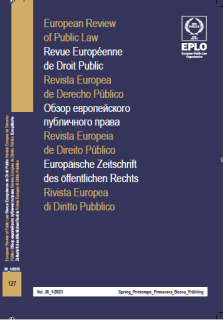
Adjudicating Climate Change (In)action from Urgenda to Neubauer:
Minimum Reasonableness and Forward-Oriented Proportionality
Associate Professor at the University of Rome “Tor Vergata”
The article focuses on one aspect of climate litigation: what is the standard of review for adjudicating climate action (or inaction, or inadequacy of such action) of a State? Comparing the legal reasonings in the cases Urgenda and Neubauer, the article argues that the Dutch Supreme Court used a ‘minimum reasonableness test’, while the German Federal Constitutional Court developed a ‘forward-oriented’ version of the principle of proportionality. The analysis shows that these different types of standards of review entail a different use and reliance on science and involve a broader or narrower judicial review on Governments’ discretion. The transformation of the principle of proportionality, as developed in the Neubauer case, potentially drives more ambitious climate action, taking seriously the principle of inter-generational equity and paving the way for primacy of climate action over other public interests. However, this trend could face some obstacles, so that also other principles – such as the duty of care and precaution – should be taken into account.
L’article se concentre sur un aspect du contentieux climatique: quel est le critère d’examen pour décider sur l’action climatique (ou l’inaction, ou l’insuffisance de telle action) d’un Etat? En comparant les raisonnements juridiques dans les affaires Urgenda et Neubauer, l’article soutient que la Cour Suprême néerlandaise a utilisé un ‘test du caractère raisonnable minimal’, alors que la Cour constitutionnelle fédérale allemande a développé une version ‘orientée vers l’avenir’ du principe de proportionnalité. L’analyse montre que ces différents types de critères d’examen entraînent une utilisation et un recours sur la science différents et impliquent un contrôle judiciaire plus étendu ou plus restreint du pouvoir discrétionnaire des Gouvernements. La transformation du principe de proportionnalité, tel que développé dans l’affaire Neubauer, pourrait conduire à une action climatique plus ambitieuse, en prenant au sérieux le principe de l’égalité entre les générations et en ouvrant la voie à la primauté de l’action climatique sur d’autres intérêts publics. Néanmoins, cette tendance pourrait affronter certains obstacles, de manière que d’autres principes – tels que le devoir de vigilence et précaution – doivent être pris en compte.





















